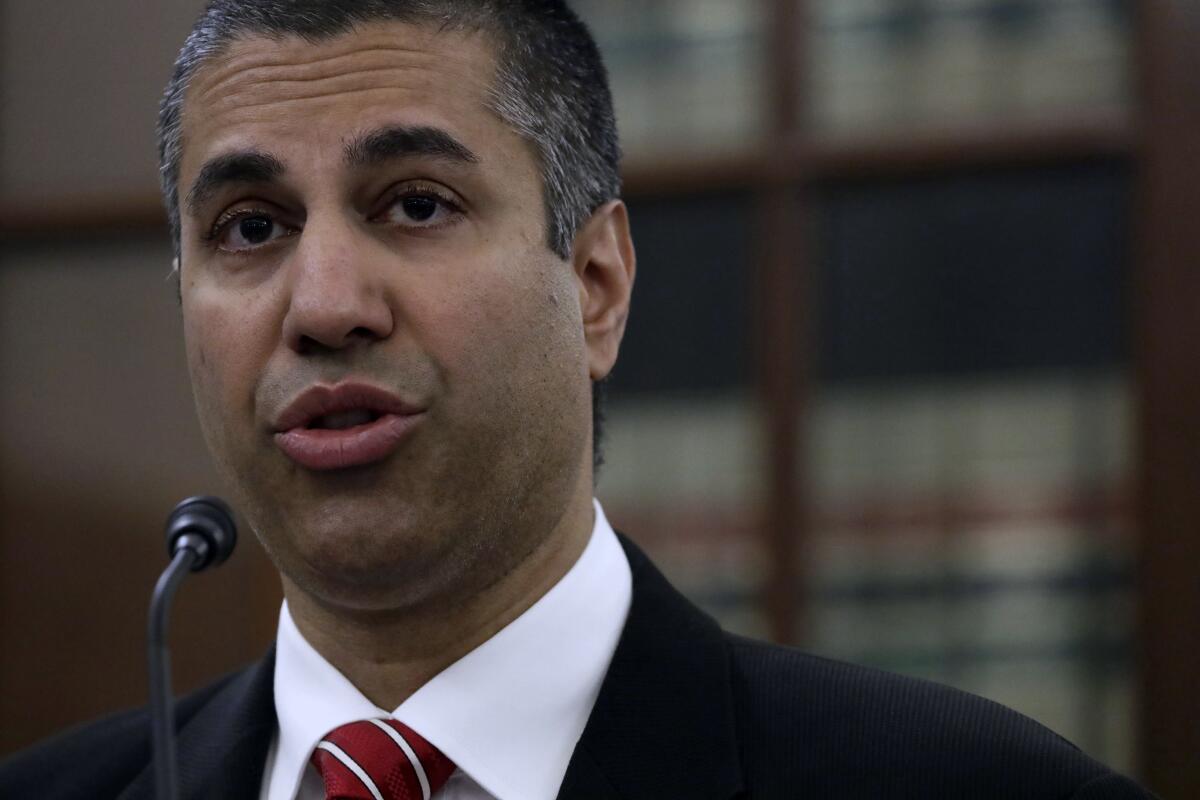FCC considers diluting social media firms’ protection, as Trump has urged

- Share via
U.S. Federal Communications Commission Chairman Ajit Pai said the agency will consider President Trump’s request to weaken a legal shield for social media companies such as Twitter Inc. and Facebook Inc. as the president intensified his call to strip companies of their protections.
The FCC will begin a rulemaking to “clarify” the meaning of a law that gives broad legal immunity to social media companies for their handling of users’ posts, Pai said in a statement.
The action follows a request by the Trump administration for regulators to dilute the decades-old law that Facebook, Twitter and Google say is crucial. Conservatives have alleged that efforts by Twitter and Facebook to moderate content on their platforms has in effect censored right-wing viewpoints — something the companies deny.
The issue boiled up again Thursday when Senate Republicans demanded to hear in person from the chief executives of Facebook and Twitter to discuss alleged censorship of a New York Post article concerning Hunter Biden, the son of Democratic presidential nominee Joe Biden. Biden’s campaign rebutted the story, which the Post said was based on materials from Trump’s personal lawyer, Rudy Giuliani.
Facebook said Wednesday that it would reduce distribution of a New York Post story about Hunter Biden while the article was fact-checked by a third-party. Twitter blocked users from sharing the story, citing a policy on hacked materials.
Trump tweeted on Thursday: “If Big Tech persists, in coordination with the mainstream media, we must immediately strip them of their Section 230 protections.” Section 230 is the part of a law that gives the companies their protection.
Twitter later said it took action to block links to the story because some of the article’s images contained material that violated Twitter’s rules about sharing personal information and hacked materials.
Senate Judiciary Chairman Lindsey Graham and Sen. Ted Cruz, both Republicans, told reporters Thursday that they will vote next Tuesday to subpoena Twitter’s Jack Dorsey to appear before the committee.
Trump first made the request for FCC action in an executive order that he signed in May. Tech trade groups, civil liberties organizations and legal scholars have slammed the action and said it isn’t likely to survive a court challenge.
Pai said in his statement that “many advance an overly broad interpretation that in some cases shields social media companies from consumer protection laws.”
“Social media companies have a 1st Amendment right to free speech,” his statement continued. “But they do not have a 1st Amendment right to a special immunity denied to other media outlets, such as newspapers and broadcasters.”
FCC Commissioner Geoffrey Starks, a Democrat, criticized Pai’s order.
“We’re in the midst of an election,” Starks said in an email. “The president’s executive order on Section 230 was politically motivated and legally unsound. The FCC shouldn’t do the president’s bidding here.”
A Facebook spokesman declined to comment. A Twitter spokesman referred to the company’s statement following Trump’s request for the rulemaking, in which it called the move “ a reactionary and politicized approach to a landmark law” and threat to “the future of online speech.”
“The 1st Amendment protects every private enterprise’s ability to set and enforce rules for acceptable content on their services,” said Elizabeth Banker, deputy general counsel for the Internet Assn., a trade group that counts Facebook and Twitter as members. A change to the constitutional guarantees found there “is clearly beyond the FCC’s reach,” Banker said.
The request to testify comes after Twitter and Facebook curbed the spread of the New York Post article Wednesday by placing restrictions on sharing the link and putting a warning notice before linking to the article amid uncertainty over the veracity of the report’s claims. Both companies also prohibit the posting of materials that have been hacked or leaked. Facebook and Twitter were blasted by Trump and Republican lawmakers who accused the companies of censorship.
The White House withdrew Republican FCC Commissioner Michael O’Rielly’s nomination for another term after he expressed doubt about Trump’s request. O’Reilly can remain on the commission until year’s end. Without his vote at the five-member commission, the proceeding would have uncertain prospects, as Pai and the remaining Republican member wouldn’t find their needed third vote from either of the agency Democrats.






